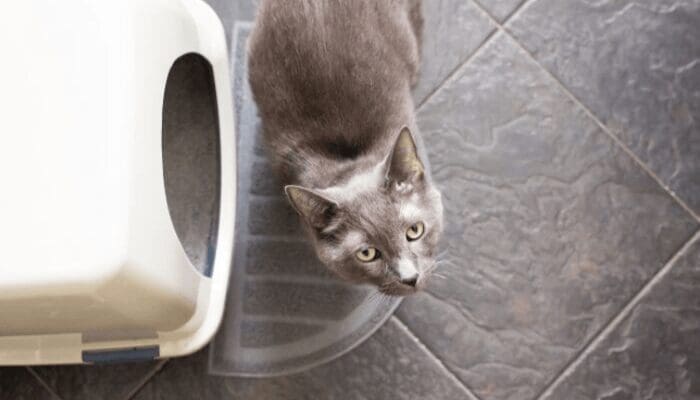9 Tips for Showing a House for Sale When You Have Cats
- Published on
- 5 min read
-
 Emma Diehl Contributing AuthorClose
Emma Diehl Contributing AuthorClose Emma Diehl Contributing Author
Emma Diehl Contributing AuthorEmma's work has been featured in Huffington Post, NPR and XOJane. When she's not combing her neighborhood for open houses, she's writing about technology, real estate or data.
Showing a house with cats calls for some creative planning. The goal with any house for sale is to make it neutral and appealing to the widest array of buyers possible. Your furry feline may be perfectly well-behaved, super skittish, or grumpy enough to be an internet sensation. Whatever the case… not everyone is a cat person.
You’ll need to prepare to get the cats out of the house in a jiff and avoid bombarding visitors with a basket full of mouse toys. Stay on top of the cat gymnastics and you’ll move on to your next home that much faster. That way the kitties can get back to their sunbathing, cuddles, or maybe just ignoring you per usual, if that’s their preferred MO!

Don’t let your cats be the focus of a buyer’s showing experience
You can take the cat out of the house but we all know who’s in charge at home. Buyers shouldn’t be reminded that “My Cat Lives Here” as they try to imagine their own potentially cat-free life in this very house. Follow these tips to tackle the presentation side of showing your house with cats.
1. Take care of any litter box odors
Veteran cat owners know how to handle a litter box. It’s not like you’re comfortable living with one that’s dirty all the time. But when your house is on the market, you’ll want to be extra militant about litter box cleanliness and scoop out the litter clumps more than once daily.
A few things to keep in mind:
Upgrade your cat litter if necessary
Self-described cat lovers on IdleCat and their readers recommend Ever Clean Extra Strength for its odor control and tidy clean up.
Contain any smells with a hood and stock up on air freshener
HomeLight spoke with Timothy Wiedman, a cat owner in Lincoln Nebraska, who had no issue selling his home outside of Lincoln, Nebraska, despite having two mature cats on site. “We used a ‘hooded’ litter box,” says Wiedman, “and kept Renuzit Super Odor Killer solid air freshener stocked in that room.
Think about a strategic litter box location for showings
Keep the litter box in a low traffic area. Wiedman discreetly tucked away the fastidiously clean litter box on the second floor half bath. “That small half-bath was ‘under the eaves’ so folks didn’t inspect the room very long,” he said.
2. Deep clean fabrics
Wash any fabrics around the house, such as window coverings and bedding, that may have absorbed any pet smells. If you can’t throw it in the laundry, consider purchasing a steam cleaner, like The Wirecutter-endorsed Bissel spot cleaner, or pay a professional to clean the upholstery for you.
Once you’ve eliminated the smell, vacuum daily to keep cat hair from fabrics and furniture. Note that the best vacuum is only as good as its extensions when it comes to pets.
Veterinarian-backed site PetMD suggests using the following extensions to tackle different surfaces in your home:
- Brush attachment
Use this tool around the baseboards of your home, so less hair will blow away and escape the vacuum. - Crevice tool
This attachment comes in handy around carpet edges, stairs, and the tight to reach corners of your floor or furniture. - Scrubbing attachment
The scrub tool is best used to knock out large balls of hair on fabric or pillows.
And as always, don’t be afraid of the liberal use of “The F-Word: Febreeze,” advises Dylan Hoffman, a top New York City agent who sells 75% more properties than the average agent in his area. A light spray of room freshener before a showing can be the final step before you head out.

3. Remove cat paraphernalia
Put away cat toys and disassemble “those big cat condos,” suggests Hoffman. Hide water and food bowls during showing appointments, and while you depersonalize your place, take down cat photos, too. For some buyers, the mere suggestion of a cat on the property can raise concerns.
Remove traces of your cat from the property and buyers will be able to focus on the space itself. If they have to sniff around for smells or watch diligently for a pet underfoot, you’ve lost out on their offer.
4. Make little repairs where needed
As you prep your house for special visitors, check railings, doors, and baseboards for signs of damage, including places where your cat may have chewed or scratched the material. For minor nicks, you can often DIY your repairs:
- For banisters and railings:
Use a filler crayon matched to your shade of wood. If the scratching goes deeper, a combination of crayons and wax filler should do the trick. - For wooden doors:
Gently sand down the scratch and area surrounding it before restoring it with a stain that matches the rest of your door. - For baseboards and molding:
Sand down the scratches, apply wood filler to the affected area, sand it smooth, then repaint or refinish the damaged area with a matching shade.
5. Be proactive and groom the cat
If your cat is known to cough up a hairball or two, get kitty to the groomer to prevent errant shedding all over the house. You can also brush at home. The FURminator deShedding Tool comes recommended by industry pros at Business Insider, and the tool’s deshedding edge claims to reduce shedding by up to 90%.

6. Worst case: Address urine stains and smells
Smell is tied directly to memory, and you don’t want buyers to remember your home by its cat smell. Depending on how long you’ve been in your home, the faint smell of your favorite pet can linger. Buyers will notice if you tried to cover up the scent, and air fresheners can often backfire on sensitive noses. Instead, opt to neutralize smells from their source.
The biggest scent offender when you have cats is urine stains on carpeting. The longer a stain sits, the deeper the smell will burrow into the fabric fibers. In some cases, the stain can soak into the carpet padding and even the wood or flooring below.
To get rid of pervading urine odors, try the following steps:
- Use enzyme-based products.
Cat urine odor is notoriously stubborn to remove. Methods like bleach or ammonia will not remove the scent and can be toxic for your pets. Go for enzyme-based urine odor removal products like Mister Max Unscented Anti Icky Poo Odor Remover or Nature’s Miracle Just for Cats Stain Odor Remover, both of which come recommended by pet experts at the Chicago Tribune. - Treat it multiple times.
Depending on how long the stain has been on the carpet, be prepared to use a treatment several times. Soak the stain with the product, then blot it and let it dry. - Enlist a friend for the sniff test.
You’ll likely be conditioned to the smell of any bad odors. Bring in a third-party, your honest friend, or a trusted real estate agent to see if your place passes muster. - If the scent lingers, consider professional cleaning.
Thanks to those pesky ammonium salts found in cat urine residues, stains can stay damp for years, and the smell will penetrate down to the pad and floor. What’s worse, stains beneath the top layer of carpeting can spread and saturate the layer below, often doubling the soiled area in size. Depending on the severity of staining on your carpet, hiring a professional might be your best bet. On average, carpet cleaning costs around $176. - Worst case scenario: Buy new carpeting.
In some extreme cases, cleaning might not even eliminate the scent. It could be time to rip up the carpet and replace it. Once the carpeting is gone, scrub the floor below with vinegar. If the smell persists after the carpeting is gone, the stains might’ve seeped into the subfloor. In that case, you’ll need to hire a professional to replace the subfloors, or try tackling it yourself.

T-minus 10 minutes ‘til buyers arrive? What to do with your cats during showings
Basic house prep when you have cats will go a long way but what you do with your cat during showings is also essential. Your cat could be a complete angel, even to strangers, but remember your cat’s not for sale, your home is. Based on our research and interviews, we recommend that you take your cat off the property during showings, or at least crate it while buyers come through.
7. Take the cat over to a neighbor or friend’s place
Best case scenario, your cat won’t be there for showings. If you have a regular cat sitter or neighbor with a flexible schedule, ask for help. Let your real estate agent know you need an allotted amount of notice before a showing to remove the cat from the property.
If you’re aiming for a fast sale, see if a friend or family member will watch your cat for the duration of the listing. Pet sitting can be a big ask, so be certain out of the gate that you’re not taking advantage of a loved one.
Offer to pay your sitter, or at least give them a small gift for doing you a favor. One pet sitter said some of her favorite gifts she received from her clients were cash, a bottle of wine, a gift certificate to the spa, or a car wash voucher (brilliant if your pet sitter took the cats in the car anywhere).
8. Crate your cat
Your cat might be shy and generally hide from strangers when they arrive in your home, but you’ll still want to crate them during showings; you can’t predict how your pet will behave.
“I can remember there was a nasty cat in one home. People always asked to touch him, and I’d say ‘no,’” says Hoffman.
“He would take swipes at people from under the desk and try to scratch them. That’s not an asset to the sale.”
Keep the crate in a low traffic corner of the house. Make sure it’s cozy and inviting for your kitty. National adoption non-profit Best Friends Animal Rescue recommends that you place treats, toys, and catnip in the crate daily so your pet has a positive association with it. When it comes time for a showing, you or your agent shouldn’t have any issues getting your cat into the crate.
9. Try to reduce your cat’s stress
Most humans find selling a home incredibly stressful, so just imagine how a cat with no idea of what’s going on might feel. Stress around the home can make your pet act out, leading to more accidents or damage to the house.
Work to reduce your cat’s stress during showings by making small, incremental changes to their environment over a few days, not hours. Don’t remove all their things at once, or try to crate train them in a single day. Even actions like changing their litter box brand or food can cause stress.
If slow, small changes are causing a cat-astrophe, try using a synthetic cat pheromone like Feliway. The spray or diffusers aren’t detectable to humans, and national veterinary site CatHealth claims the pheromone will calm your cat down while creating a more comforting environment.
You love your furry pet, but you can’t guarantee all potential buyers will. When some people see pets in the home, they immediately think smell, mess, and damage. By eliminating these causes for concern, your buyers can focus on the property alone, instead of the cute cat in the corner.
Header Image Source: (Kate Stone Matheson/ Unsplash)
